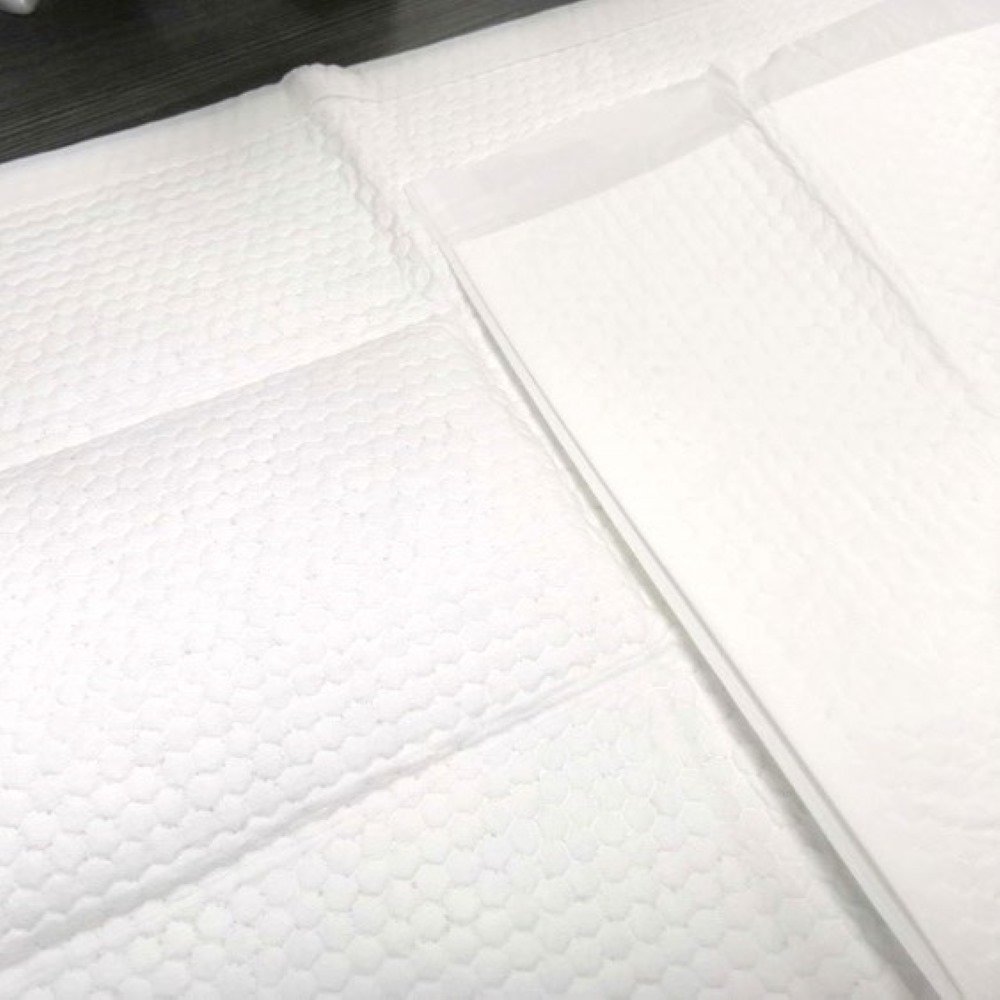Introduction to Underpads
Underpads, commonly known as bed pads or mattress pads, are essential for those requiring extra protection against incontinence, spills, or leaks. Designed to lie atop mattresses, chairs, or other furniture, underpads serve as a protective barrier, keeping surfaces dry and hygienic. Available in disposable and reusable forms, they cater to various needs, offering choices that depend heavily on specific user situations and preferences.
What are Underpads?
Underpads are layered sheets with absorbent materials and a waterproof backing. They are primarily used in healthcare settings and homes to protect mattresses and furniture from moisture and stains.
Types of Underpads (Disposable vs. Reusable)
- Disposable Underpads: Often used in hospitals and care facilities for their convenience and hygiene, disposable underpads are meant for one-time use.
- Reusable Underpads: Made from durable materials that can withstand multiple washes, reusable underpads are a cost-effective and environmentally friendly option for ongoing use.
The Importance of Underpads
Underpads are not merely about protecting furniture—they enhance the quality of life for users and caregivers by providing a clean, comfortable environment. Their role extends beyond simple protection, aiding in infection control and skin health maintenance, particularly for those with limited mobility or incontinence issues.
Protective Benefits
Underpads help in preventing damage to expensive furniture and bedding, saving money and effort in maintenance and replacements.
Enhancing Comfort and Convenience
For caregivers and users, underpads offer a practical solution that simplifies cleaning and maintenance, reducing stress and labor in caregiving scenarios.
Factors to Consider When Choosing Underpads
Selecting the right underpad involves understanding the specific needs of the user and the situations in which the underpad will be used. Here are some key considerations:
Size Considerations
The size of the underpad should be sufficient to cover the area of the furniture where protection is needed. It should overlap the edges to ensure complete coverage and prevent leaks.
Material Types
The choice of material affects the comfort, absorbency, and breathability of the underpad:
- Polyester: Offers durability and is quick-drying.
- Cotton: Provides comfort and is ideal for sensitive skin due to its natural fibers.
- Blends: Mixes of materials can offer a balance of functionality and comfort.
Niveaux d'absorption
Selecting the correct absorbency level is crucial:
- Light: For minor leaks and spills.
- Moderate to Heavy: For overnight use or severe incontinence, ensure that the surface stays dry.
Types of Underpads Available
The market offers a variety of underpads designed for different needs and preferences. Understanding the types available can help in making an informed choice:
Polymer-based Underpads
These underpads use super absorbent polymers (SAP) to lock in moisture and are often used in medical settings for their high efficiency.
Cotton and Fiber Underpads
Ideal for those with sensitive skin or allergies, cotton underpads offer comfort and good absorbency, though they may need more frequent changes.
Specialized Underpads (Antimicrobial, etc.)
Some underpads come with special treatments or coatings to reduce odor and control bacteria, ideal for users prone to infections or those with strong odor issues.
Understanding Absorbency Needs
Proper assessment of absorbency needs is essential to choosing an effective underpad. This involves understanding both the user’s medical needs and their lifestyle.
Assessing Absorbency Requirements
Consider the amount and frequency of incontinence or spills. For heavier needs, a more absorbent underpad is necessary to prevent frequent changes and ensure comfort.
Comparing Product Specifications
Always check the product specifications for absorbency levels and compare them with the user’s requirements. Look for products that offer additional features like odor control and quick drying.
User-Specific Selection
Underpads should be chosen with the user’s specific circumstances in mind, whether they are infants, adults with mobility issues, or even pets.
Underpads for Infants
Choose smaller, softer underpads with moderate absorbency to ensure comfort and prevent rashes.
Underpads for Adults
Adults might require larger underpads with higher absorbency, especially for overnight use or those with severe incontinence.
Underpads for Pets
Pet underpads are designed to be durable and withstand the wear and tear of pets. They often have features like odor control and quick-dry top sheets.
Each of these sections is tailored to provide detailed insights, keeping the article’s tone supportive, uplifting, and inclusive, suitable for the diverse, educated, and professional audience aged 20 to 50 years.
Installation and Maintenance
Proper installation and regular maintenance are key to maximizing the effectiveness and lifespan of underpads, regardless of whether they are reusable or disposable.
Proper Placement
To ensure that underpads perform their protective function effectively:
- Place the underpad so that it fully covers the area at risk of exposure to liquids.
- For beds, extend the underpad slightly beyond the edges of the area where the person sleeps.
- Secure the underpad to prevent it from shifting during use, especially if the user moves frequently in their sleep.
Cleaning and Maintenance Tips
For reusable underpads:
- Wash them at a high temperature to kill any bacteria and remove stains.
- Use a gentle, hypoallergenic detergent to prevent irritation for sensitive skin.
- Dry underpads thoroughly before reuse to maintain their absorbency and comfort.
Top Brands and Products
Knowing which brands and products to trust is crucial when selecting underpads. This section reviews some of the leading brands and provides a comparative analysis of their top products.
Review of Leading Brands
Some of the most trusted brands in the underpad market include:
- Brand A: Known for high absorbency and durability.
- Brand B: Offers a range of eco-friendly, reusable underpads.
- Brand C: Specializes in underpads with advanced odor control technologies.
Comparative Analysis of Top Products
A detailed comparison of underpads from these brands can help users choose based on their specific needs, such as absorbency, comfort, environmental impact, and price.
Purchasing Strategies
Smart purchasing strategies can help users find high-quality underpads that meet their needs at the best possible price.
Where to Buy Underpads
Underpads can be purchased from:
- Medical supply stores
- Online retailers
- Directly from manufacturer websites for potential discounts on bulk purchases
Online vs. Offline Shopping Tips
- Online: Compare prices and read customer reviews to gauge the performance of different underpads.
- Offline: Inspect the quality of underpads firsthand and consult with sales representatives for advice based on specific needs.
Bulk Purchasing Considerations
Buying in bulk can reduce the cost per unit, which is particularly beneficial for facilities like nursing homes or for families needing a steady supply of underpads.
Economic and Environmental Impact
The choice between disposable and reusable underpads involves considering both economic and environmental impacts.
Cost-Effectiveness
- Disposable Underpads: While they offer convenience, the ongoing cost can accumulate significantly over time.
- Reusable Underpads: These require a higher initial investment but are more cost-effective in the long run due to their durability and the ability to be washed and reused.
Environmental Considerations of Disposable vs. Reusable
- Disposable: Generate significant waste, contributing to landfill usage.
- Reusable: More environmentally friendly as they reduce waste, though they require energy and water for laundering.
Guide complet pour choisir les bonnes serviettes hygiéniques
This section summarizes the key takeaways from the article, offering a concise guide to making informed choices about underpads.
Key Takeaways on Making the Right Choice
- Assess the specific needs based on the user’s condition, environment, and frequency of use.
- Consider both the immediate cost and the long-term implications of choosing between disposable and reusable options.
- Always prioritize comfort and skin health, particularly for users with sensitive skin or mobility issues.
Conclusion
Choosing the right underpad involves understanding the specific needs of the user and the situation in which the underpad will be used. By considering factors such as absorbency, material, and environmental impact, users can make choices that offer both comfort and practicality. This guide aims to empower readers with the information necessary to make informed decisions about underpads, enhancing the care and comfort of those who rely on them.

